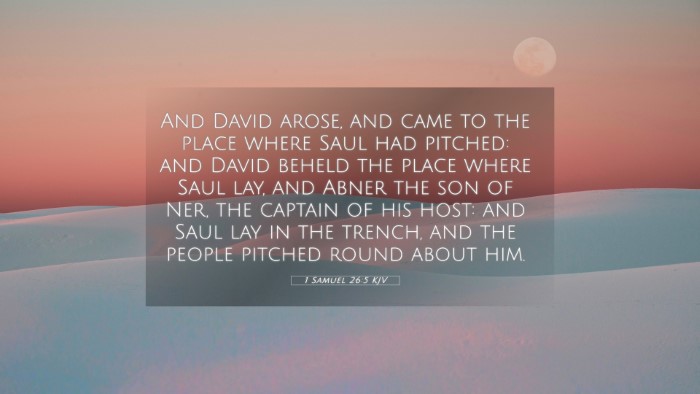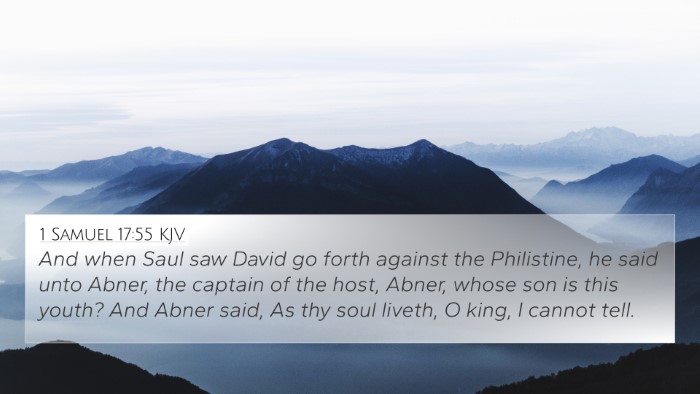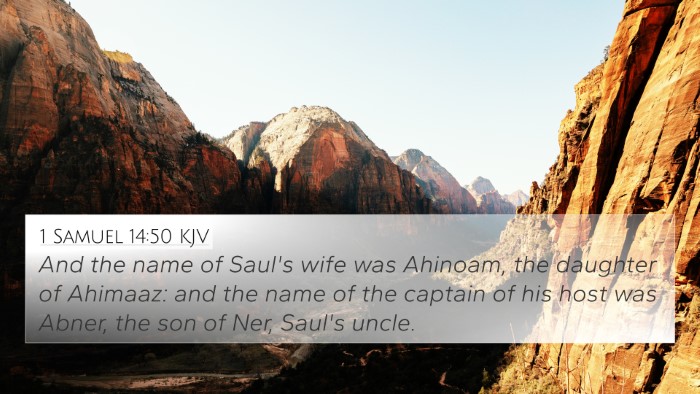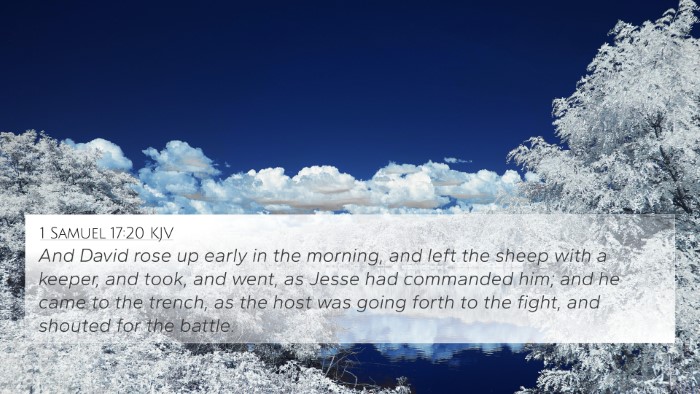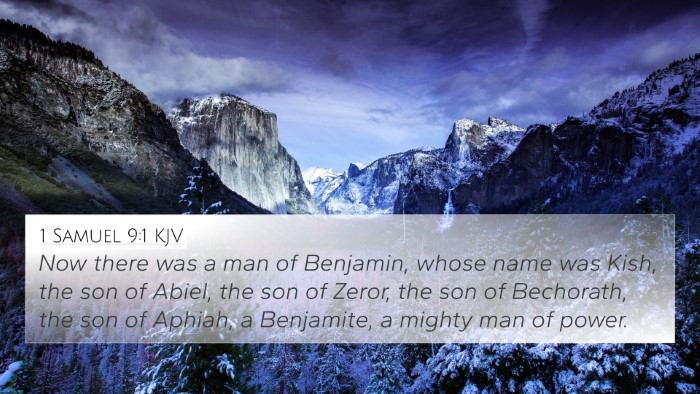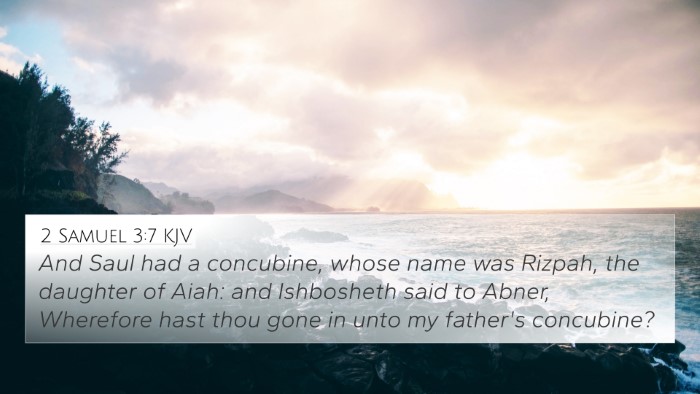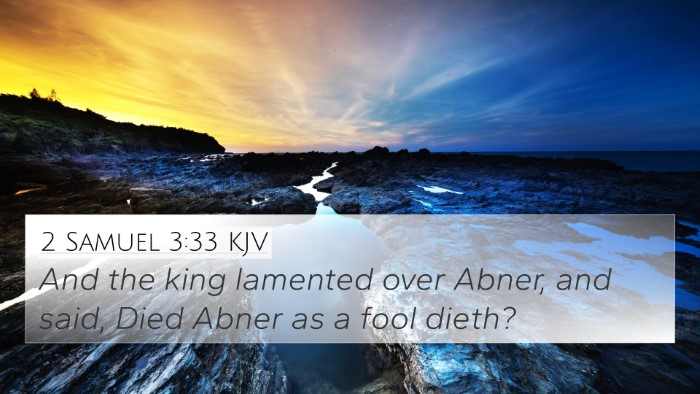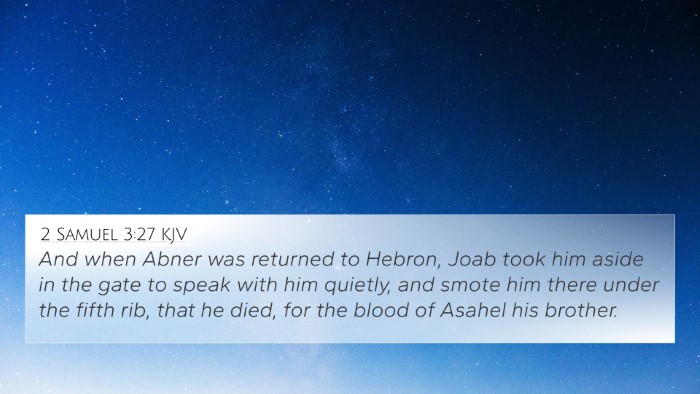Understanding 1 Samuel 26:5
1 Samuel 26:5 states: "And David arose, and came to the place where Saul had pitched: and David beheld the place where Saul lay, and Abner the son of Ner, the captain of his host: and Saul lay in the trench, and the people pitched round about him." This verse encapsulates a significant moment in David's pursuit of Saul, revealing themes of leadership, loyalty, and divine protection.
Verse Context and Summary
This chapter continues the narrative of David fleeing from King Saul, illustrating the tension between these two figures. David's approach to Saul’s camp demonstrates both his strategic mind and his moral integrity, as he contemplates the implications of taking Saul's life.
Commentary Insights
-
Matthew Henry's Commentary
Matthew Henry emphasizes David's restraint, noting that he had the opportunity to kill Saul but chose instead to spare him. This act highlights David's heart as a leader who resists the temptation of violence, trusting in God’s timing and justice.
-
Albert Barnes' Commentary
Albert Barnes discusses the geographical context of this event. He points out the strategic importance of the location, indicating how David’s movements are intentional and carefully planned. Barnes also notes the significance of Abner’s presence, as it underscores the seriousness of the situation.
-
Adam Clarke's Commentary
Adam Clarke highlights the psychological tension within David. He portrays David not just as a fugitive but as a thoughtful individual grappling with the implications of his actions. Clarke also reflects on Saul's state, emphasizing the contrast between Saul's physical security and his spiritual downfall.
Thematic Connections
This verse presents numerous connections to other biblical texts, inviting a deeper examination of its themes:
-
1 Samuel 24:10 - David spares Saul's life, reinforcing the theme of mercy.
-
Romans 12:19 - "Vengeance is mine; I will repay, saith the Lord," reflecting the principle that God is the ultimate judge.
-
Psalm 57:1 - A Psalm of David when he fled from Saul, revealing David's reliance on God during adversity.
-
2 Samuel 1:11-12 - David mourns Saul’s death, showing his respect and love for his king despite their tumultuous relationship.
-
Proverbs 16:7 - "When a man's ways please the Lord, he maketh even his enemies to be at peace with him," illustrating the blessing of integrity in conflict.
-
Matthew 5:44 - Jesus teaches to love enemies, echoing the principle David exemplifies in this moment.
-
1 Peter 2:20-23 - Counsel on suffering wrongfully, likening believers' conduct to David's in strata of adversity.
Practical Application
The insights derived from 1 Samuel 26:5 have profound implications for modern believers:
- Integrity in Leadership: Leaders should be marked by their moral decisions, reflecting their values even when faced with temptation.
- Trusting Divine Timing: The importance of patience and faith in God’s plan amidst personal struggles.
- Spiritual Reflection: Engaging with the Bible through cross-references enhances understanding and enriches spiritual growth.
Conclusion
1 Samuel 26:5 serves as a testament to the complexity of human relationships and the intricate dynamics of power and morality. The insights gathered from various public domain commentaries provide a richer understanding of David’s character and his reliance on God amidst turmoil. Engaging with cross-references not only illuminates the text but fosters a deeper engagement with the entirety of scripture.

